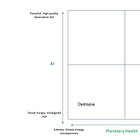Pragmatism Rebuilding our $100T Economy Sustainably

The issue of sustainability is among many significant controversies that have spiraled out of control and begun to adjust across party lines in many countries. At one extreme, there are those who believe any sacrifice is justified to prevent our planet from becoming uninhabitable. This includes immediate divestment from fossil fuels, forcing regulations that will increase costs on basic goods and services, avoiding air travel and animal protein, etc. The most extreme voices believe destroying historic art and treasures are reasonable actions to get the world’s attention. At the other extreme, there are climate change deniers or those that believe that because the effort is too significant for very small impact, humanity should just double down on fossil fuel production and hope better solutions come along later while we find ways to adapt.
At Avila, our worldview and one of our raisons d’etre is a belief in centrism and pragmatism.
On the issue of climate denial, we have written a cheat sheet for the skeptics and have little patience for wholehearted rejection of scientific consensus built over decades. We also believe that even for skeptics the data points are too many to entirely avoid paying some insurance premium – we have logged record temperatures, heat waves, flooding, heat deaths, wildfires, tragedies such as over a thousand deaths in a pilgrimage, and record billions in damages. In our own backyard, the “100 year flooding” events are recurring way too frequently to average out to 1% risk anymore.
On the issue of how to move forward, we believe it’s not straightforward, but the economic opportunity in front of us is as big as any other mega-trend in our economy, and investors ignore it at their peril. There are legitimate debates at the macro level (How high of a priority should tackling climate be amongst other key priorities like improving standards of living, education, access to healthcare, defending democracy?) and at the micro level (Is expensive direct air capture a good use of limited funds? Should we tax batteries and solar panels from China thus delaying the transition? How much to allocate for near-term mitigation vs. long-term mitigation vs. adaptation?), which require nuance and depth.
What we do know is that to accomplish significant change at scale, we must harness the forces of capitalism, support businesses that deliver a better value proposition beyond being more sustainable, and bring along everyone, not just one side of the political aisle. We also need to be cognizant that energy is fundamental and directly correlated to economic progress, and thus supporting abundant and cheap energy should be intrinsic in the pursuit of sustainability. We believe the existing energy providers and raw materials suppliers are some of the best partners and financiers to support the transition, as we wrote here. Yet we also believe industrial policy and regulation have a role to play to ensure we move forward in the right direction. In the case of individual governments, just as we believe the regulatory framework should encourage competition and reduce red tape, we also believe it can provide the right short-term incentives to support its private businesses and citizens to win in the economy of the future (case in point China’s battery and EV success) – be it in technology or energy. In the face of unpredictable geopolitical realignment, securing access to critical minerals and metals as well as achieving industrial independence in key sectors will be essential. And needless to say, a large and vibrant nuclear and renewables economy (from hydro and geothermal to intermittent like wind and solar) economy also provides more abundance and energy independence.
Within the fringes there is a wide tent of valid views on the issue of climate change and how we should tackle it. The way forward is for each of us to work with those who are to the center of our position to find common ground and move forward so we can rebuild – and grow – our $100T economy sustainably.
There is no time to waste and those that embrace the opportunity pragmatically and early will reap meaningful rewards. Success might not come overnight, but it will be massive and defensible.
Let’s do it!
To discuss or learn more about Avila VC please reach out to us!
Follow us for sporadic postings on LinkedIn and X, and Patty Wexler on Medium







